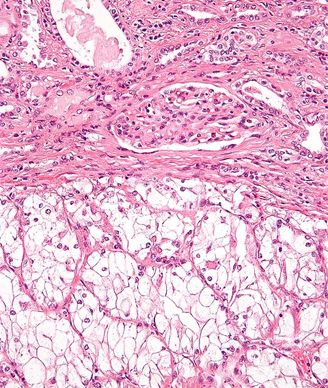MicroRNA Cluster Linked With Kidney Cancer Prognosis
Expression of microRNA (miR)-23b/27b cluster has been linked with increased risk for clear cell RCC disease progression, and may be a predictor of poor survival.
High magnification micrograph of a clear cell renal cell carcinoma. H&E stain. Copyright 2009 Nephron.

Expression of microRNA (miR)-23b/27b cluster has been linked with increased risk for clear cell renal cell carcinoma (RCC) disease progression, and may be a predictor of poor survival, according to the results of a study published recently in the Journal of Urology.
In their prior research, Tomoaki Ishihara, of the department of urology at Kagoshima University, and colleagues found that the miRNAs within the miR-23b/27b cluster were downregulated in cancer tissues. According to the research, this downregulation suggested that this miRNA cluster may be a tumor suppressor in clear cell RCC.
“No effective markers have been identified for predicting RCC recurrence or distant metastases,” the researchers wrote. “Therefore, discovery of novel, specific markers or factors that can predict recurrence or distant metastases after nephrectomy is essential.”
To evaluate this further, the researchers conducted another study to see if there was any association between the miR-23b/27b cluster and outcomes in patients with clear cell RCC. They used 61 samples of clear cell RCC and 61 normal kidney samples from patients who underwent radical nephrectomy or partial nephrectomy between 2004 and 2010. The researchers used quantitative real-time RT-PCR to evaluate the expression levels of miR-23b and miR-27b, and then evaluated any association between miRNA expression and overall survival.
According to data from the patient samples, expression levels of miR-23b and miR-27b were significantly lower in tumor tissues compared with normal kidney samples (P < .0001 for both).
The researchers then divided the samples according to whether there were high or low levels of miR-23b/27b expression. They found that levels of the miRNA were significantly downregulated in patients with T3 stage or higher, and grade 3 tumors.
In addition, results indicated that overall survival was significantly shorter in those patients with low miR-23b/27b expression compared with those patients with high expression levels. However, expression levels alone were not independent predictors of survival.
“Measurement of the expression levels of these miRNAs may be a good prognostic marker for clear cell RCC,” the researchers wrote. “Investigation of molecular networks based on the miR-23b/27b cluster could contribute to elucidation of new molecular mechanisms of clear cell RCC.”